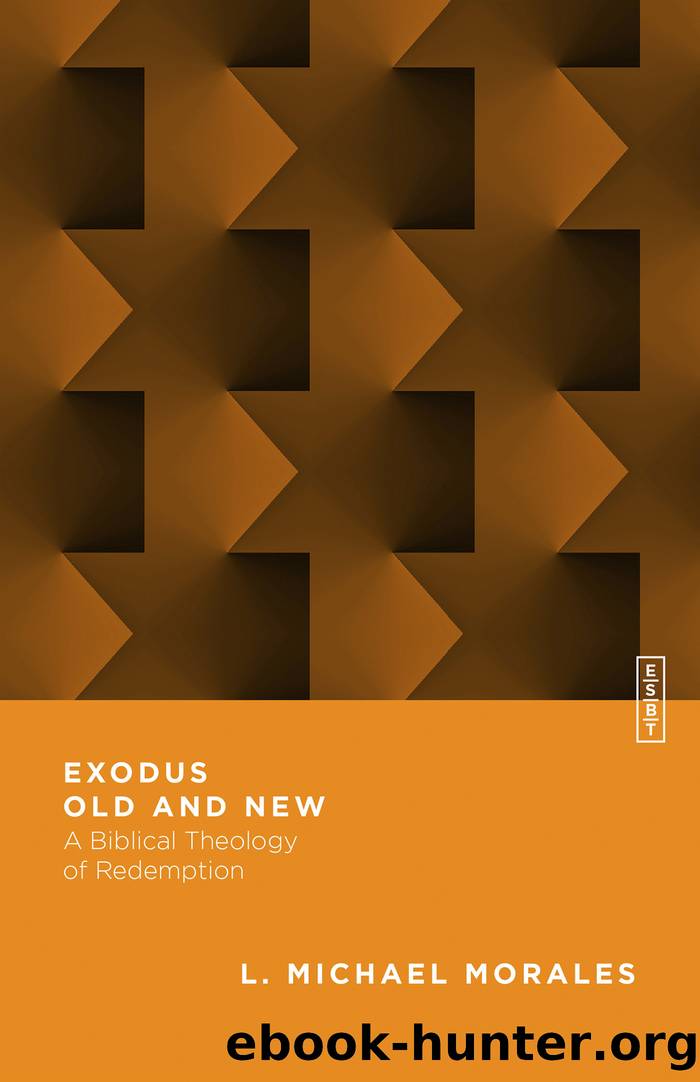Exodus Old and New by L. Michael Morales

Author:L. Michael Morales
Language: eng
Format: epub
Tags: Essential studies in biblical theology;esbt;biblical theology;story of the bible;biblical narrative;introduction to biblical theology;biblical theology;redemption history;exodus;exodus theme in scripture;exodus theme in the bible;passover;new exodus;second exodus;servant of yahweh;old testament in the new testament;biblical theology of exodus;exodus biblical theme
Publisher: InterVarsity Press
Published: 2020-06-29T11:33:12+00:00
FROM SOLOMONâS TEMPLE TO THE BABYLONIAN EXILE
The very next chapter after the Queen of Shebaâs visit to Jerusalem, 1 Kings 11, narrates how Solomonâs heart turned away from Yahweh so that he even built places of worship for the false gods of his many foreign wives. Rather than publishing the glory of his name, Israel caused the name of Yahweh to be profaned among the nations (Ezekiel 36:22; see also Isaiah 52:5; Romans 2:24). Yet the contrast before and after 1 Kings 11 is not so sharp. Amidst the narrative voyage from Egypt to Mount Zion, strong undercurrents of rebellion and sin continually threatened to pull Israel out to the dark abyss of judgment. Sadly, the story of Israel is one of dismal failure from the beginning. Even as Mount Sinai trembled with the thunderous presence of Yahweh God, newly redeemed Israel had displayed a rebellious heart given over to apostasy, worshiping a golden calf. Then there were the rebellions in the wilderness, where a generation of thousands died in unbelief for refusing to inherit the land, only to have the second generation commit spiritual harlotry with the daughters of Midian and Moab (Numbers 25). The book of Judges, portraying the first centuries of life in Canaan, narrates how as soon as Joshua and the second generation of Israelites died, the people immediately followed other gods, forsaking Yahweh to serve Baal and Ashtoreth (Judges 2:10-17).
Into the era of the monarchy, as we have already noted, Solomon, the same son of David who built the temple on Mount Zion for Yahwehâs name, loved hundreds of foreign wives who eventually turned his heart away from Yahweh so that he âwent after Ashtoreth the goddess of the Sidonians, and after Milcom the abomination of the Ammonites,â and he âbuilt a high place for Chemosh the abomination of Moab . . . and for Molech the abomination of the people of Ammon,â burning incense and sacrificing to the gods of his foreign wives (1 Kings 11:1-13; see also Deuteronomy 17:17). As a result, God would strip away ten of the twelve tribes from the Davidic kingdom. The ten tribes would form the larger northern kingdom, who were wayward from the beginning, having set up golden calves for worship in their leading cities of Dan and Bethel. None of their kings, moreover, were entitled to the divine promises given by Yahweh to Davidâs line. After despising and persecuting a long line of prophets, including the likes of Elijah, Elisha, Amos, and Hosea, the northern kingdom, refusing pleas to return to Yahweh, finally reaped the ultimate covenantal threat of exile in 721 BC. Yahweh sent the Assyrian armies to devastate and destroy his people, scattering them afar like so many nations from the Tower of Babel (2 Kings 17:5-23).
The southern kingdom of Judah, although enduring for another 135 years, would eventually suffer the same judgment, sieged and taken into captivity by the might of Babylon in 586 BC (2 Kings 25). The prophet Ezekiel sets forth
Download
This site does not store any files on its server. We only index and link to content provided by other sites. Please contact the content providers to delete copyright contents if any and email us, we'll remove relevant links or contents immediately.
Hebrews, James by George H. Guthrie & George H. Guthrie(454)
Ideology by Eagleton Terry;(447)
Israel: Ancient Kingdom or Late Invention? by Daniel I. Block(443)
The 9.9 Percent by Matthew Stewart(425)
Take Back Your Time by Christy Wright(413)
The New Oxford Annotated Bible with Apocrypha by unknow(412)
Eating the Bible by Rena Rossner(406)
Insights on Hebrews by Charles R. Swindoll(404)
The Book Every Leader Needs to Read by 48 Authors(398)
Psalms, Proverbs, Ecclesiastes, and Song of Songs by John W. Hilber & Tremper Longman III & Duane Garrett(371)
Commentary on the Torah by Richard Elliott Friedman(347)
Commentary on James (Commentary on the New Testament Book #16) by Robert H. Gundry(346)
Judges: Volume Two by unknow(340)
The Jew in the Lotus by Rodger Kamenetz(339)
Who Wrote the Bible? by Richard Elliott Friedman(336)
NKJV, Ignite, eBook by Thomas Nelson(332)
Job, Ecclesiastes, Song of Songs by August H. Konkel & Tremper Longman III(329)
Proverbs, Ecclesiastes, Song of Solomon (Ancient Christian Commentary on Scripture) by J. Robert Wright(325)
Reading the Bible with Rabbi Jesus by Tverberg Lois(309)
